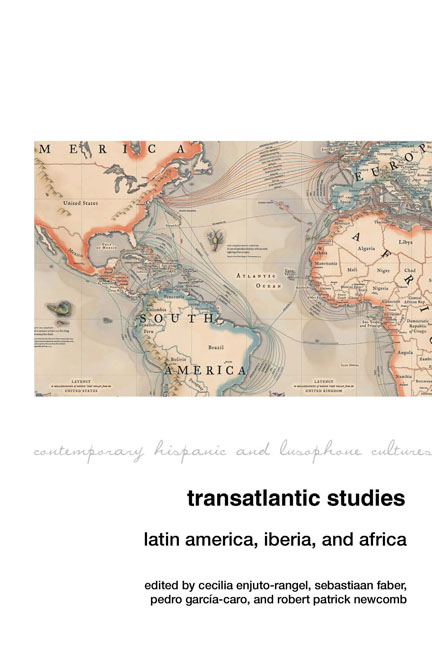Book contents
- Frontmatter
- Contents
- Introduction: Transatlantic Studies: Staking Out the Field
- Transatlantic Methodologies
- Transatlantic Linguistic Debates
- Transatlantic Displacement
- Transatlantic Memory
- Transatlantic Postcolonial Affinities
- Transatlantic Influence
- Epilogue: The Futureâif There Is OneâIs Transatlantic
- Index
18 - Ethical Questions about Human Trafficking during Times of Dictatorship: Kidnapped Children in Spain and Argentina
- Frontmatter
- Contents
- Introduction: Transatlantic Studies: Staking Out the Field
- Transatlantic Methodologies
- Transatlantic Linguistic Debates
- Transatlantic Displacement
- Transatlantic Memory
- Transatlantic Postcolonial Affinities
- Transatlantic Influence
- Epilogue: The Futureâif There Is OneâIs Transatlantic
- Index
Summary
This chapter analyzes another form of dictatorial subjugation by focusing on a transatlantic approach to texts that rebel in some way against the entrenched legacy of the most recent dictatorships in Spain and Argentina. It is estimated that 30,000 Argentinians disappeared between 1976 and 1983, the period in which the country was ruled by a military junta. These desaparecidos were secretly detained and killed in over three hundred clandestine detention centers. According to the report of the National Commission on the Disappeared (CONADEP), 30 percent were women, many of them pregnant and held as prisoners until they gave birth. After their babies were born, these women were killed and their newborns were either given or sold to conservative military families (1984). Similarly, in the context of Spain, the Franco regime (1939–75) also tried to silence all sectors of society that were deemed to be subversive. Such a goal was achieved by means of state-institutionalized violence that endeavored to repress, kill, abduct, imprison, and torture anyone who was associated with the Republic. During both dictatorships, thousands of children were torn from their biological families, based on the rationale that their parents were considered morally dangerous and that the state needed to avoid the degeneration of the race. These practices of abduction became quite common in both countries, where the offspring of detainees were placed with families who identified with the ideology promoted by the dictatorship in order to strip them of their identities by re-educating and reintegrating them into a “clean” nation. It is difficult to estimate how many of them were illegally adopted by families loyal to these dictatorships or were appropriated by state institutions. What is clear is that the dictatorial regimes of Spain and Argentina organized a systematic child trafficking network that aimed to raise them “properly” for the “healthy” future of the national body. In relation to this metaphor of the body of the nation, Ruth Teubal considers the appropriation of minors as a terrorist and patriarchal attack against maternity. According to her, by retaining captive children and giving them away, the totalitarian abuse of the state is reinforced, because once the ties with the biological mother are eliminated, the state shows that it can control everything, even human lives (2003: 231).
- Type
- Chapter
- Information
- Transatlantic StudiesLatin America, Iberia, and Africa, pp. 218 - 228Publisher: Liverpool University PressPrint publication year: 2019



